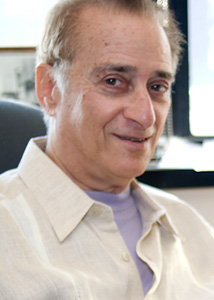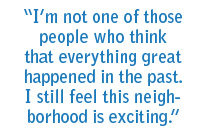 David Rothenberg has lived in the city since 1959 and in the West Village since 1964. While producing an Off-Broadway play about prison in 1967, he founded The Fortune Society, which supports successful re-entry into society for formerly incarcerated men and women. Today the Society boasts over 175 full- and part-time employees. David also does a radio show on WBAI every Saturday morning..
David Rothenberg has lived in the city since 1959 and in the West Village since 1964. While producing an Off-Broadway play about prison in 1967, he founded The Fortune Society, which supports successful re-entry into society for formerly incarcerated men and women. Today the Society boasts over 175 full- and part-time employees. David also does a radio show on WBAI every Saturday morning..
For David Rothenberg, born in 1933 across the river in Hackensack, Greenwich Village was always the place he was destined to be.
“My family used to tell me that when I was four or five and they first brought me into the city I looked around and said, ‘Thank God there’s something else!’” he relays, laughing. “I always knew the Village was where I wanted to live. However, when I got out of the Army I first took an apartment uptown. I had a series of jobs and then began to work for a theatrical press agent. Producer Alexander Cohn hired me to handle the press for all of his shows. One of them was Richard Burton’s Hamlet. This was while he was having his very public affair with Elizabeth Taylor so it was an exciting time! After that, I needed a vacation so I took a freighter to Italy where I became enamored of their piazzas. When I returned I found an apartment on Sheridan Square, calling it ‘my piazza’. That was 1964 and I’ve been in the West Village ever since.”
How did a theatrical press agent start something like The Fortune Society? “In 1967 I produced a play called Fortune and Men’s Eyes at the Actors Playhouse,” Rothenberg recalls. “It was a gritty play about what happens to a kid who goes to prison, written by a man who had been there himself. I used my life savings—$12,000 at the time—to produce it because no one else would. It was a success, and we started a dialogue with the audience after the performances. Joining us on stage were people who had been in prison and I was moved by their struggles to re-enter society. I said, ‘We should start educating the public about the kinds of job and housing barriers you’re all facing.’ So my theater office on 46th Street became the headquarters for the Society. By 1971 I had to make a career choice so I gave up theatre and for the next 18 years I was full-time director of the Society. After I ran for City Council in 1985 and lost, I went back to the theater and re-opened my press office. I retired from that in 2001, but I’m still more heavily involved with the Fortune Society than I ever was.”
When asked what the Village was like when he first moved here, Rothenberg responds, “Wonderful! It was where I wanted to be, the part of the universe that attracted me. Off-Broadway theatre started here in the Village. Everything was free, non-judgmental, and creative. The Bagel and the Riviera were hangouts. There were always the jazz clubs and the Village Gate. You could go to Bigelow’s late at night and get a sandwich or an early breakfast at three or four in the morning.”
 Yet Rothenberg doesn’t dwell on the past for too long, particularly since some things have improved. “I love what they’ve done down by the piers,” he says. “It’s nicer than it ever was. And opening the Center on13th Street so that gay people have a place to go was exciting.” He does worry, though, about sky-high housing prices putting pressure on preservation efforts. “It’s always about the real estate people,” he says ruefully. “They’ve become the oil tycoons of Manhattan! Jane Jacobs always said, ‘Save the neighborhoods. That’s what makes a city strong.’ The Village is a wonderful neighborhood and it should be preserved.”
Yet Rothenberg doesn’t dwell on the past for too long, particularly since some things have improved. “I love what they’ve done down by the piers,” he says. “It’s nicer than it ever was. And opening the Center on13th Street so that gay people have a place to go was exciting.” He does worry, though, about sky-high housing prices putting pressure on preservation efforts. “It’s always about the real estate people,” he says ruefully. “They’ve become the oil tycoons of Manhattan! Jane Jacobs always said, ‘Save the neighborhoods. That’s what makes a city strong.’ The Village is a wonderful neighborhood and it should be preserved.”
Does he have any last thoughts on being a resident of the West Village? “Just about how lucky I am to be here for all these years,” Rothenberg readily admits. “When I first got here all you heard was ‘Everything was great twenty or thirty years ago!’ I’m very nostalgic myself about the days when I came here. I look back and I miss things. You soon realize, though, that what you’re really missing is your youth, when it was all new and fresh. But I’m not one of those people who think that everything great happened in the past. I still feel this neighborhood is exciting. That’s because people who march to a different drummer come to the Village. They always will.”
Photo: David Rothenberg
